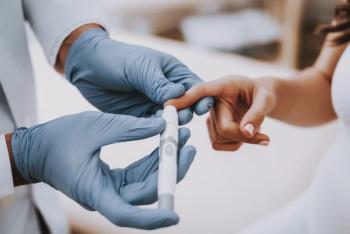
- Drug Topics December 2022
- Volume 166
- Issue 12
Time To First Prescription Fill at Health System, External Pharmacies Reviewed
Timing of treatment initiation is crucial for patients with cancer.
For the approximately 12% of women in the United States diagnosed with breast cancer in their lifetime, initiating treatment in a timely manner is crucial to obtaining the best treatment outcomes. However, it has become “increasingly complex” to obtain oral oncology specialty medications “given the interactions needed among providers, specialty pharmacies, insurance companies, pharmacy benefit managers (PBMs), and…drug manufacturers or independent foundations’ financial assistance programs,” according to the authors of a recent article published in the Journal of Hematology Oncology Pharmacy.1
These barriers, the authors continued, include issues with patient insurance coverage, direct copay costs, identifying additional financial support to cover medication-related expenses, the identification of the correct pharmacy, completion of prior authorizations and related appeals, and actually obtaining the specialty medications. Previous research has shown that the current median or mean time to medication access for oral cancer therapies, for example, ranges from 6 to 12 days.
Health system specialty pharmacies are intended to address these barriers. Also known as medically integrating dispensing pharmacies, health system specialty pharmacies frequently report quicker access for patients to vital medications compared with external pharmacies. But, there’s one key catch: many health plans, the researchers wrote, “require patients to use the PBM-owned specialty pharmacy,” rather than allowing insititutions to dispense oral oncolytic medications themselves.
A 2018 abstract published in the Journal of the National Comprehensive Cancer Network evaluated the delays associated with radiosensitizing capecitabine administered in combination with radiation to treat rectal cancer. Study results demonstrated that “significantly more” patients experienced delays in receiving capecitabine therapy when working with external specialty pharmacies compared with patients able to fill via the Mayo Clinical health-system specialty pharmacy (52.9% vs 11.4%, respectively). Based on these data, investigators in the current study sought to determine if there were similar significant delays in receiving palbociclib, a cyclin-dependent kinase (CDK) 4/6 inhibitor used to treat metastatic hormone receptor (HR)-positive, human epidermal growth factor receptor 2 (HER2)-negative breast cancer.
Researchers conducted a single-center, retrospective review of prescription-level data from patients aged 18 years or older diagnosed with advanced or metastatic HR-positive, HER2-negative breast cancer with an initial palbociclib prescription between May 2018 and June 2019 at the Mayo Clinic Cancer Center in Rochester, Minnesota. In total, 88 patients met inclusion criteria; 39 patients had their first prescription fill at an external specialty pharmacy, while 49 patients filled at the Mayo Clinic health system speciality pharmacy.
Median time to first fill in the health system specialty pharmacy cohort was 6 days (interquartile range [IQR], 4-10), compared with 12 days (IQR, 8-18) in the external pharmacy group. Excluding time spent navigating insurance approval and benefits investigations, external pharmacies took a median of 7 days (IQR, 3-10) to fill prescriptions.
“This modified time to first fill for external pharmacies was not significantly different…however, the steps included in each group in this comparison were vastly different,” the researchers noted, “because the majority of the external pharmacies received the new prescription with the [prior authorization] and insurance approval already in place” after being processed by the Mayo Clinic health system specality pharmacy.
Seventy patients in the cohort had prior authorization information available; 62 prescriptions were initially improved (internal n=33; external n=29) while 8 were initially denied and then approved (n=3 and 5, respectively). Patients with an initial PA denial experienced “significantly longer median time to their first prescription fill” compared with those who did not (14 days vs 7.5 days). Median time from when the prescription was written to PA approval was 2 days at the Mayo Clinic pharmacy. After removing barriers including PA approval and external prescription redirection, processing time was 3 days internally vs 7 days at external pharmacies.
“This study demonstrated a doubling in the total time to first fill when patients used an external specialty pharmacy compared with our integrated [health-system speciality pharmacy],” the researchers concluded. “Delays…can be multifactorial and can vary widely. Further exploration of this impact and the identification of common barriers leading to delays in the time to first fill are being addressed in an effort to decrease the time to first fill and to expedite the treatment of patients with advanced or metastatic breast cancer who are prescribed CDK4/6 inhibitors.”
Reference
- Golbach AP, Taraba JL, Smith MD, Mara KC, Giridhar KV. Time to first palbociclib prescription dispense at Mayo Clinic: Comparing a health-system specialty pharmacy with external specialty pharmacies. J Hematol Oncol Pharm. 2022;12(5):241-247
Articles in this issue
about 3 years ago
2022 Top News from Drug Topicsabout 3 years ago
New Approaches in Psoriasis and Psoriatic Arthritis Treatmentabout 3 years ago
Treating Skin Cancers in the Immunotherapy Eraabout 3 years ago
What’s New in Acne and Rosacea?about 3 years ago
A Study of Immune Checkpoint Inhibitors and Complication Ratesabout 3 years ago
Evaluating Chronic Itch and Quality of Lifeabout 3 years ago
Biosimilar Uptake Increases After Changes to EHRabout 3 years ago
Mental Health Telemedicine Barriers Spur Call for Reformabout 3 years ago
How Drug Shortages Are Prevented by the FDANewsletter
Pharmacy practice is always changing. Stay ahead of the curve with the Drug Topics newsletter and get the latest drug information, industry trends, and patient care tips.























